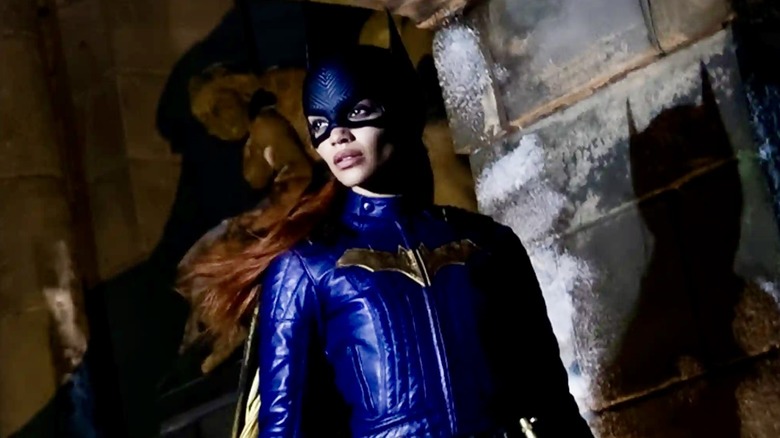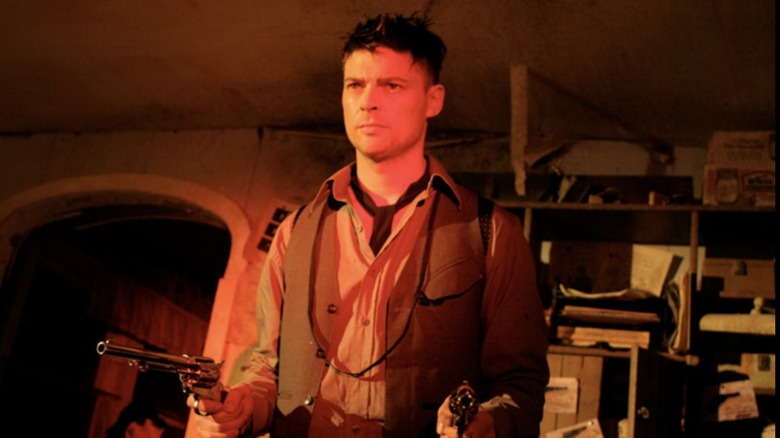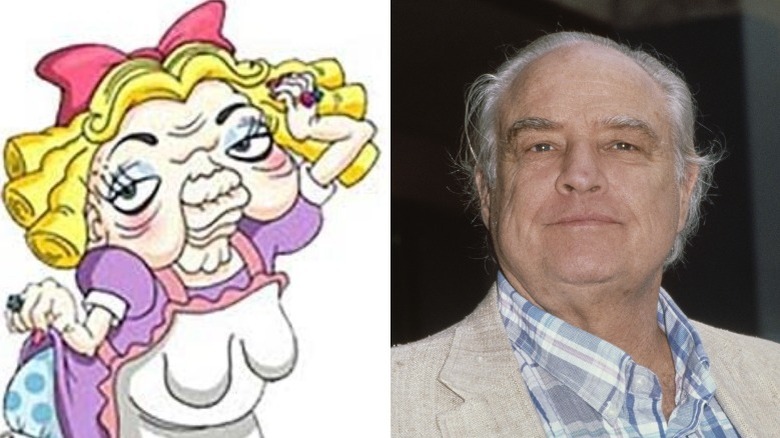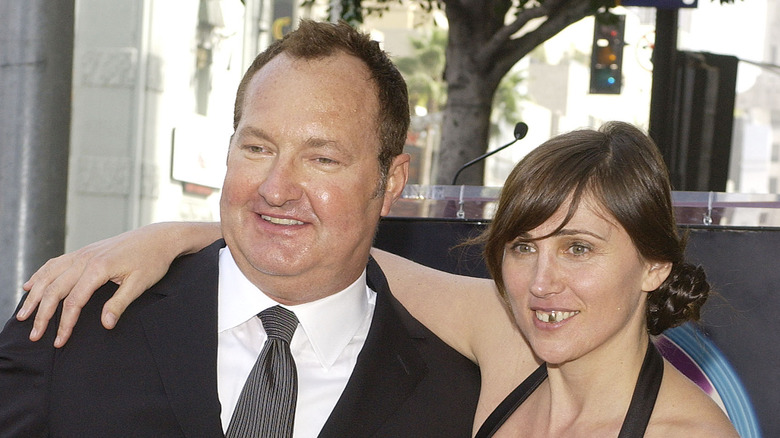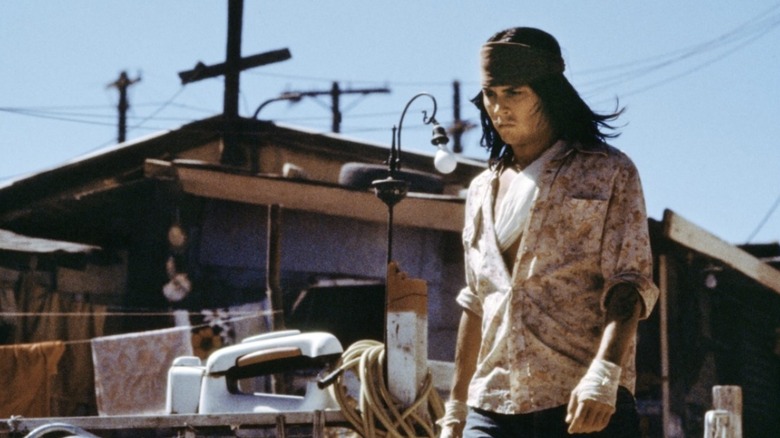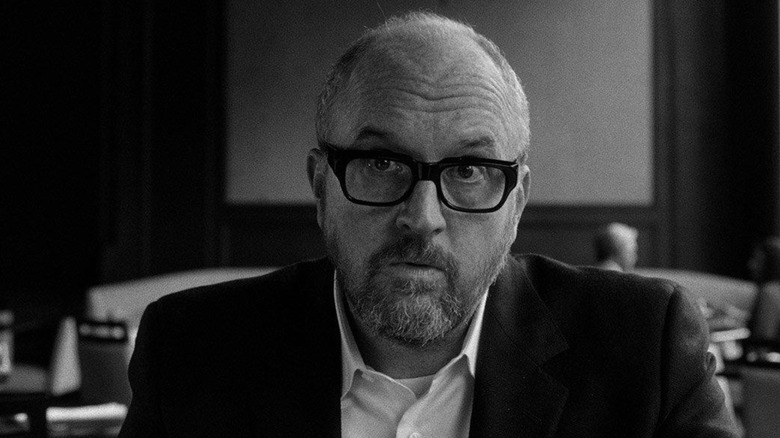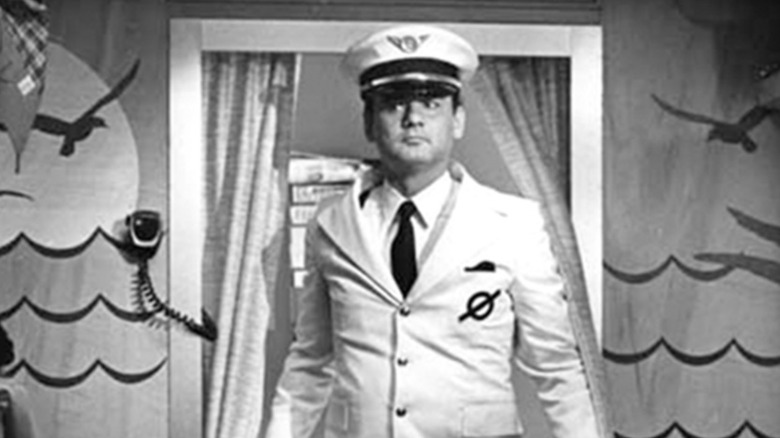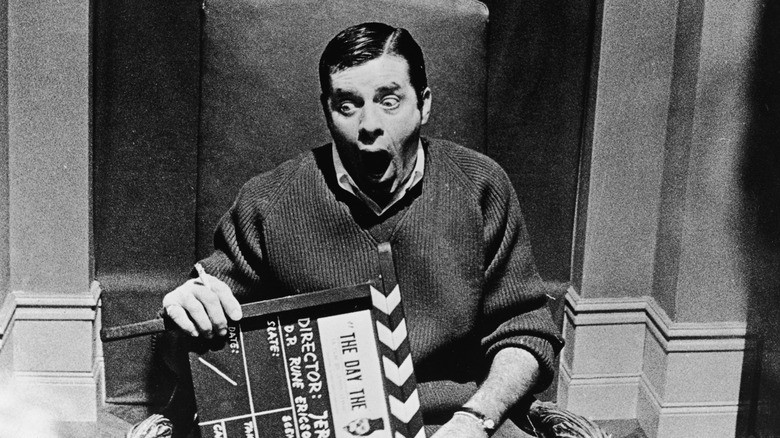The Most Expensive Movies That Were Finished But Never Released
Not releasing a film is an expensive choice for a distributor to make. It is very rare for a movie to make it to the post-production phase and not be released for public consumption, yet, there is a number of films that were completed but never given a theatrical release. Some were mired in legal battles, while others weren't released simply because they were awful. For example, after a poor showing at the Rome Film Festival and terrible reviews, "Gods Behaving Badly," a 2013 comedy starring Christopher Walken, John Turturro, Sharon Stone, and Alicia Silverstone, wasn't given a theatrical release.
Some films have languished in film purgatory for no apparent reason. "All-Star Weekend," the independently financed comedy and Jamie Foxx's directorial debut, still hasn't been released, despite having an all-star cast and being filmed in 2016. "Man, it's been tough, with the lay of the land when it comes to comedy, man. We're trying to break open those sensitive corners where people go back to laughing again," Foxx told Cinema Blend, while suggesting Robert Downey Jr. being cast as a character of Mexican descent may have contributed to the comedy not being released. Join us as we review the most expensive movies that were finished but never released.
Empires of the Deep
The first Chinese production of a fantasy film attempting to rival Hollywood blockbusters was "Empires of the Deep," and it was an epic failure. The film was estimated to have a budget ranging from $100 million to $130 million depending on the source, but it was never released. The film was the brainchild of Jon Jiang, a Chinese real estate mogul with a passion for movies and a dream of making Hollywood movies in China.
The production was troubled during the developmental, filming, and post-production phases. Jiang wrote the script himself, working through 40 versions with the help of 10 Hollywood screenwriters. The film lost one director, Jean-Cristophe "Pitof" Comar, before production even began, and had three other directors — Jonathan Lawrence, Michael French, and Scott Miller. All directors had complaints about both Jiang and the ill-fated production.
The actors were unknown, other than Olga Kurylenko, the Ukrainian Bond actress, who was cast as the mermaid queen. Despite finishing production and releasing a trailer, the film was never distributed. The original concept and screenplay were "incomprehensible to an international audience," screenwriter Randall Frakes told Den of Geek, adding, "I did not hold out much hope of this film being accepted by the general public, either in Europe, the States or even in China." From our extensive research, "Empires of the Deep" is the most expensive movie that was finished, but never released.
Batgirl
In 2022, Warner Brothers announced "Batgirl" had been scrapped and wasn't even going to stream on HBO Max. Many were shocked that a film starring Leslie Grace as Barbara Gordon and Batgirl, with Michael Keaton reprising his role as Batman, and Brendan Fraser as Firefly would suffer such a cruel fate. Kevin Smith criticized Warner Bros. for canceling "Batgirl" and not "The Flash."
"I saw the movie," DC co-chairperson and CEO Peter Safran told Deadline. "There are a lot of incredibly talented people in front of and behind the camera in that film, but that was not releasable." Warner Bros. cited poor test screening for shelving the project. "The decision to not release 'Batgirl' reflects our leadership's strategic shift as it relates to the DC universe and HBO Max," a spokesperson said, adding, "Leslie Grace is an incredibly talented actor and this decision is not a reflection of her performance."
Warner Bros. Discovery CEO David Zaslav shelved the film, taking a tax write-off for the $90 million production. Canceling "Batgirl" was also considered a blow to the representation of POC in films. "What I find most lamentable is that now a whole generation of little girls are going to have to wait longer to see a Batgirl and say, 'Hey, she looks like me,'" Fraser told Variety, adding, "That makes me sad. I know how good she [Grace] was. And I know what this would mean to so many people."
Gore
Allegations of sexual misconduct against Kevin Spacey surfaced in 2017 when actor Anthony Rapp alleged that Spacey made sexual advances toward him after a party in Spacey's home when he was only 14. These allegations expanded to include employees of "House of Cards," after which Netflix dropped the Oscar-winning actor. Spacey was originally suspended and then fired from Netflix's political series and the streaming giant went one step further by pulling the plug on "Gore," a biopic about the literary icon Gore Vidal that Spacey was producing and starring in.
Shelving the biopic and severing ties with Spacey cost Netflix millions, and according to Buzz Feed News, canceling the film was likely Netflix's only option. Given the recent allegations against Spacey, a film exploring Vidal's views on transactional sex, which included scenes depicting the grooming of a young man for a sexual relationship with a much older man might trouble viewers after learning about the recent allegations against the actor. "Gore" isn't the only film not to find its way to audiences after the star was accused of sexual misconduct, but it might be one of the most expensive, costing approximately $39 million.
Black Water Transit
With an estimated production budget between $26 and $48 million depending on the source, "Black Water Transit" is one of the more expensive films that finished production but was never released. The thriller was filmed in post-Katrina New Orleans and based on a Carsten Stroud crime novel of the same name. Despite the excellent cast, including Karl Urban, Laurence Fishburne, and Stephen Dorff, audiences never saw the film because it was caught up in legal troubles.
The film was reportedly screened at Cannes in 2009 with a rough cut, but Capitol Films went bankrupt during filming, and a series of lawsuits made it impossible to release the film. When director Tony Kaye tried to turn over the final cut of the film, the studio allegedly refused the delivery, with producer David Bergstein calling the film, "unreleasable."
Although the lawsuit the film was caught up in was settled in 2010 and the film rights were sold later that year at auction, the film was never released. Kaye seems to have a knack for running into trouble in post-production, as he did with "American History X," but it seems his issues with finding the film in the editing room were compounded by financing issues that were beyond his control. Although it is doubtful that we will ever see "Black Water Transit," it isn't impossible. Director David O. Russell's film, "Nailed," which was caught up in the same lawsuits, eventually came out as "Accidental Love" years after filming ended.
Hippie Hippie Shake
With a reported budget of $20 million pounds (nearly $25 million dollars), this English indie film is set during the '60s and based on a memoir by Richard Neville, the co-founder of the counterculture magazine, OZ. The movie was filmed in 2007 with director Beeban Kidron at the helm and drummed up some interest because Cillian Murphy was starring as Neville and Sienna Miller as his girlfriend, Louise Ferrier. However, Kidron reportedly left the project during post-production and the film was never released.
"I'm not sure whatever happened with that [...] I don't think we'll see it at this point. I never really heard what happened," Miller told Yahoo! In 2017, adding, "I did see a rough cut of it and it was a pretty beautiful film, but there was some legal something or other. I don't know." There was an early test screening and a positive review by Ain't It Cool News, remarking on the "London locations, pounding sixties soundtrack and psychedelic visuals."
"Hippie Hippie Shake" was waylaid in post-production purgatory. "I suspect... it's going to land in the direct-to-video bin," the managing director of the distributor Universal Pictures in Australia told The Sydney Morning Herald. "It's off our release schedule." According to IMDb, the film is still in development, but Neville told The Sydney Morning Herald, "Universal Pictures decided to shelve the film and save themselves a lot of tax payments."
Big Bug Man
With a $20 million budget, the adult animated feature, "Big Bug Man," is one of the more expensive movies to be inexplicably shelved and never released after being completed. The animated feature was written by Bob Bendetson and co-directed with "Family Guy" alum animator Peter Shin, and starred Brendan Fraser as Howard Kind, an employee at a candy factory who becomes a superhero after being bitten by a bug.
Although he was approached to play the villain, Marlon Brando opted to play the villain's wife, Mrs. Sour and reportedly dressed in costume while recording his lines in his home while on oxygen. This was Brando's last performance, and he finished recording his lines a couple of weeks before his death.
According to Den of Geek, "Big Bug Man" was slated for release in 2006 but was delayed. The website for the animated feature has vanished, but there are still storyboards available online. What happened to Brando's last performance, and the animated feature, is a bit of a mystery, but considering how much time has passed, it is doubtful we will ever see the animated film.
The Debtors
In 1999, Randy Quaid, Michael Caine, and Catherine McCormack starred in "The Debtors," a comedy about a group of people with various addictions who meet while gambling in Vegas. Randy's wife, Evi Quaid, directed the film, but the project ran into trouble after filming wrapped. The independent comedy had an estimated production budget between $14 and $16.4 million, depending on the source, and while this isn't a big budget for a movie, it's a lot of money for a film that was finished but never released.
The primary financier of the project, Charles Simonyi, who reportedly invested $12.6 million in the film, requested an injunction against "The Debtors" being released after it had been completed, citing creative differences. "I've been encouraged to tone down a scene about the pic's S & M fashion-heavy party sequence in which a member of the German rock band Rammstein wears rubber genitalia," Evi told Variety, but Simonyi declined to comment.
When Simonyi won his injunction request, the Quaids were forced to declare bankruptcy in January 2000, because of the $3.5 million they had invested in the film, but could not recoup after it wasn't released. This marked the beginning of a long stretch of financial woes and legal troubles for the Hollywood couple. They would continue to make headlines for legal issues for over a decade after declaring bankruptcy.
The Brave
"The Brave," a screen adaptation of a book by Gregory McDonald, is about a native man, Raphael, who is courted to star in a snuff film for $50,000 after being released from prison. He agrees because he is desperate to help his impoverished family. This dark premise spoke to Johnny Depp who starred in the lead role. "I felt driven to do this movie," Depp told The Los Angeles Times. "This was one of the most difficult things I've ever done. It just about ripped me to shreds."
"The Brave" hit a roadblock when the original director, Aziz Ghazal, went missing right before filming began and was suspected of killing his estranged wife and 13-year-old daughter. When Ghazal's body was found a month later, the double murder was revealed as a tragic murder-suicide. After Ghazal's death, Depp signed on to act, direct and co-write "The Brave" which screened at Cannes in 1997 but was never released.
The independent film had an estimated production budget of approximately $8 million, which is a shoestring budget. Depp invested $2 million in the film himself, making it an expensive feature-length directorial debut for the actor. After screening at the film festival, "The Brave" received an awful review from Variety, and failed to attract a distributor. Despite the critical review, many Depp fans would still be curious to see this film that seems to have been cursed from the beginning.
I Love You Daddy
Louis C.K. directed, wrote, and starred in the 2017 film, "I Love You Daddy," co-starring Chloë Grace Moretz, Rose Byrne, and John Malkovich. The black-and-white film is about a man whose teenage daughter is seduced by a much older filmmaker with a notorious reputation, and it's been suggested that Woody Allen inspired the film. The Orchard purchased distribution rights to the film for $5 million after it was screened at the Toronto Film Festival, but sexual misconduct allegations against C.K. derailed the release of the film.
"There is nothing about this that I forgive myself for. And I have to reconcile it with who I am," C.K. later told Deadline, adding, "I have spent my long and lucky career talking and saying anything I want. I will now step back and take a long time to listen." After the distributor canceled the release, C.K. bought back the rights for $5 million, with additional charges for marketing expenses ranging between $500,000 and $1 million.
When asked if "I Love You Daddy," should be released, Moretz said she didn't think so, "I think it should just kind of go away, honestly. I don't think it's time for them to have a voice right now," the actress told The New York Times. "Of course, it's devastating to put time into a project and have it disappear." Although C.K. hasn't chosen to release the film, a piracy group called Hive-CM8 leaked the film online.
The Queen of Media
Although Wendy Williams would one day produce a biopic and documentary about her life for Lifetime, there was an earlier biopic called "The Queen of Media" based on Williams' bestselling memoir, "Wendy's Got The Heat." Robin Givens starred as the former DJ turned talk show host, but the biopic was never released. The film had an estimated $3 million dollar budget, making it a low-budget movie, but when a film is self-financed, not releasing the movie is definitely a financial blow.
In a 2018 interview on "The Wendy Williams Show" with Givens, Williams admitted she decided not to release the 2011 biopic because of her talk show, but the trailer on Facebook suggests Williams made the right call by shelving the project as the $3 million budget is apparent in the trailer. When asked about what happened to the biopic in 2021, Williams responded, "Everything prior to divorcing Kelvin was a Kelvin thing," telling the Los Angeles Times, "That project, I don't know what happened to it. You'll have to call him."
Nothing Lasts Forever
In 1984, Bill Murray had an enormous hit with "Ghostbusters" and Zach Galligan starred in "Gremlins," but the two actors also co-starred in another movie that year, which was never released. "Nothing Lasts Forever" is a sci-fi comedy, with an estimated $3 million dollar budget, making it a small-budget indie flick. The black and white film is about a struggling artist, Adam (Galligan) who moves to New York only to discover it has become a totalitarian state run by the port authority. Adam takes a bus trip to the moon, and Murray is the conductor.
According to Slate, the film wasn't released because of legal issues concerning the copyrights of movie clips included in "Nothing Lasts Forever," although writer-director Tom Schiller said he never got a definitive answer from the studio why it wasn't released, he assumes it wasn't deemed commercial enough for wide distribution. The film was temporarily leaked online and has graced European television and private screenings at Murray's behest. Still, the quirky sci-fi comedy was never officially released and has sat on the studio's shelves gathering dust for nearly 40 years.
The Day the Clown Cried
"The Day the Clown Cried" is a 1972 film about the Holocaust following a clown who entertains children as they are rounded up and sent to concentration camps for extermination. The film had an estimated $2 million dollar budget, which Jerry Lewis, who directed, co-wrote, and starred in the film, provided most of. However, Lewis never let the film be released. "I was ashamed of the work," Lewis told an audience, "and I was grateful that I had the power to contain it all and never let anybody see it. It was bad, bad, bad."
Despite Lewis' strong opinion about the movie, film critic Jean-Michel Frodon thought "The Day the Clown Cried," had merit. The film wasn't initially released because Joan O'Brien, who co-wrote the original script, wasn't happy with the film and wouldn't sign over the rights. There were also legal troubles between Lewis and the producer, Nat Wachsberger, who actually lost the option before Lewis began filming.
Lewis gave the Library of Congress his copy of the film in 2015, with the stipulation it couldn't be viewed until 2024. Although some may view Lewis' rough cut in the near future, it is doubtful this mysterious film will ever be given a theatrical release. Despite being the least expensive film on this list, Lewis' "The Day the Clown Cried" demonstrates the curiosity that arises, and the legendary status a film can gain from never being released to the public.


